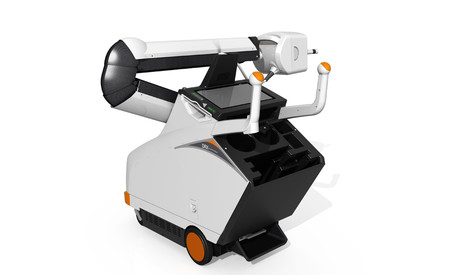Lightweight X-ray machine approved by FDA

Adelaide-based start-up Micro-X has announced that its DRX Revolution Nano, a lightweight X-ray machine for mobile radiography, has received Food and Drug Administration (FDA) approval. The 510(k) approval is the first regulatory approval for a carbon nanotube-powered X-ray product, and means the machine can now be marketed in the US through Micro-X’s distribution partner, Carestream Health.
To be sold in up to 130 countries, the machine has a sleek and compact design, with the carbon nanotube technology and a lithium-iron phosphate battery helping it achieve a weight of about 93 kg. In comparison, Carestream’s previous model weighs in at 567 kg. The lighter weight means the machine does not need a motor to move around, making it easy to transport and position in cramped critical care areas.
According to Micro-X Managing Director Peter Rowland, the cart’s clever design has enabled simple and fast assembly at the Tonsley Innovation Hub in Adelaide. Furthermore, about half of Micro-X’s staff previously worked at General Motors’ Holden car assembly plant in Adelaide, allowing Rowland to use their production line expertise to streamline his own manufacturing process.
“So much of it is about the supply chain — we can build one of these things in four hours,” he said.
Micro-X has the sole rights to apply the technology in the field of mobile medical. The company also has a contract with the Australian Department of Defence to develop and demonstrate the technology of an ultralightweight, digital mobile X-ray, which is optimised for use in military-deployed medical facilities.
“We are pleased and proud to have achieved this highly significant milestone in the Nano’s commercialisation program,” he said.
“Our focus now is on supporting Carestream’s upcoming trade trials and preparations for volume production at Tonsley with our supply chain partners.”
Colour palette expands for bioluminescent cell imaging
Researchers have expanded the colour palette of bioluminescent protein to 20 distinct colours,...
Ball-shaped debris back on NSW beaches; source still unknown
Three months after mysterious ball-shaped debris first started washing up on NSW beaches, the...
New scanning method observes lung function in real time
Using the new scanning method, the team are able to reveal the parts of the lung that air...



